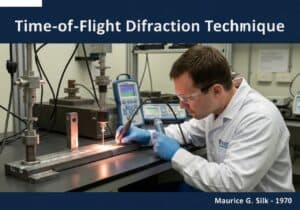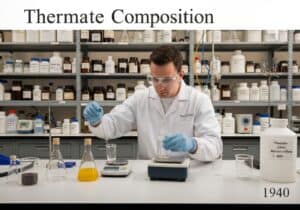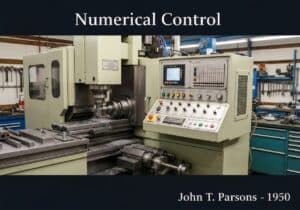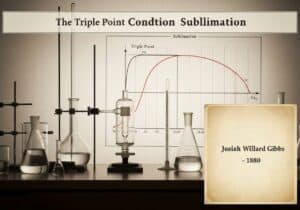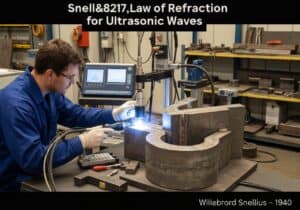Exothermic welding, also known as thermite welding, is a technique that uses the superheated molten metal from an aluminothermic reaction to create a strong, permanent molecular bond between metal components. The process is self-contained, requiring no external power source. It is most famously used to join sections of railway track into continuous welded rail, creating a smoother and more durable track.
Exothermic Welding
- Hans Goldschmidt
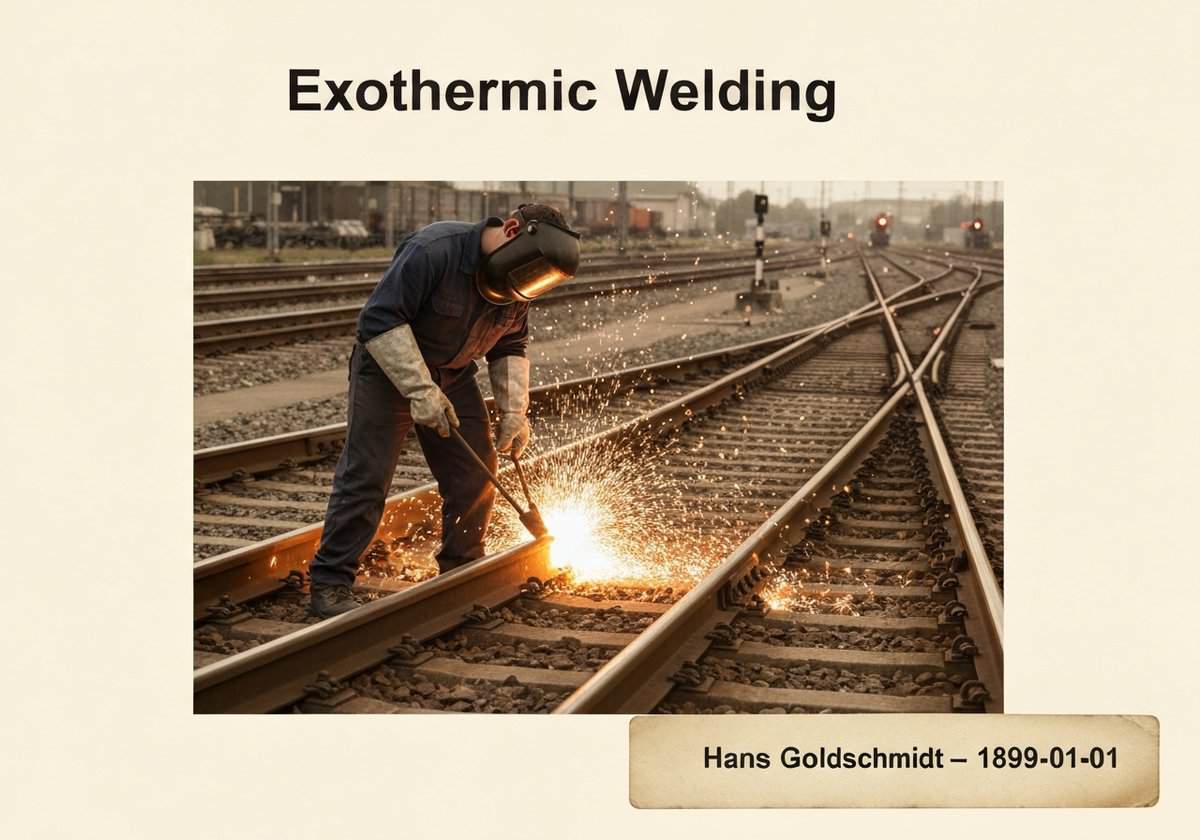
The process of exothermic welding begins with the precise alignment of the two metal pieces to be joined, leaving a specific gap between them. A refractory mold, designed to match the cross-section of the parts, is clamped around the joint. The metal ends are often preheated with a torch to remove moisture and ensure a good fusion. A crucible containing the thermite charge is placed over the mold. After the thermite is ignited, the exothermic reaction proceeds inside the crucible, producing molten metal (e.g., steel) and a lighter slag of aluminum oxide. Once the reaction is complete, a tapping mechanism at the bottom of the crucible is opened, allowing the heavier molten metal to flow down into the mold cavity. The superheated liquid metal fills the gap, melting the surfaces of the parent metal pieces and fusing with them. The lighter aluminum oxide slag flows in last, filling the top of the mold and forming a protective layer over the molten steel, shielding it from atmospheric contamination as it cools.
After a prescribed cooling and solidification period, the mold is removed, and any excess metal and slag are trimmed away, typically by grinding, to produce a smooth, continuous joint. The resulting weld is not just a filler but a cast steel fusion that has a microstructure similar to the parent metal, resulting in excellent mechanical and electrical properties. Its primary advantage is its portability and independence from electricity, making it the ideal Verfahren for creating strong, reliable welds on large components in remote field locations.
Typ
Unterbrechung
Verwendung
Vorläufersubstanzen
- the invention of the goldschmidt process itself
- advances in metallurgy and the understanding of steel and iron properties
- development of refractory materials (ceramics) capable of containing molten metal
- the expansion of railway networks, which created a demand for more durable rail joints than mechanical fishplates
Anwendungen
- welding railway rails into continuous welded rail (cwr)
- joining large copper conductors for electrical grounding grids (e.g., at substations)
- repairing heavy steel castings or forgings that are too large for conventional welding
- attaching cathodic protection anodes to steel pipelines
- creating permanent electrical connections in lightning protection systems
Patente:
Mögliche Innovationsideen
!Professionals (100% free) Mitgliedschaft erforderlich
Sie müssen ein Professionals (100% free) Mitglied sein, um auf diesen Inhalt zugreifen zu können.
VERFÜGBAR FÜR NEUE HERAUSFORDERUNGEN
Maschinenbauingenieur, Projekt-, Verfahrenstechnik- oder F&E-Manager
Kurzfristig für eine neue Herausforderung verfügbar.
Kontaktieren Sie mich auf LinkedIn
Integration von Kunststoff-Metall-Elektronik, Design-to-Cost, GMP, Ergonomie, Geräte und Verbrauchsmaterialien in mittleren bis hohen Stückzahlen, Lean Manufacturing, regulierte Branchen, CE und FDA, CAD, Solidworks, Lean Sigma Black Belt, medizinische ISO 13485
Wir suchen einen neuen Sponsor
Ihr Unternehmen oder Ihre Institution beschäftigt sich mit Technik, Wissenschaft oder Forschung?
> Senden Sie uns eine Nachricht <
Erhalten Sie alle neuen Artikel
Kostenlos, kein Spam, E-Mail wird nicht verteilt oder weiterverkauft
oder Sie können eine kostenlose Vollmitgliedschaft erwerben, um auf alle eingeschränkten Inhalte zuzugreifen >Hier<
Verwandte Erfindungen, Innovationen und technische Prinzipien
